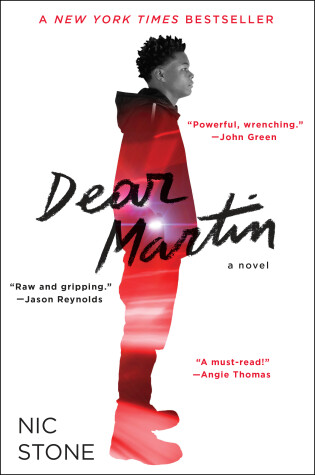Reviewed by nannah on
Okay, don’t get me wrong. This book and the topics it covers are very important (antiblackness, police brutality, the different responses to black boys being killed by cops, among others), but the writing is not strong. That's obviously not a very popular opinion, though, and I’ll never be upset that something like this has gotten so popular.
Content warnings:
- racism
- antiblackness
- police brutality
- domestic abuse mention (very brief)
- sexism and misogyny
Representation:
- the main protagonist is Black
- two secondary protagonists and a love interest are also Black
- another love interest is Jewish
(the Goodreads summary is awful … it spoils the book!)
Justyce McAllister grew up in a rough neighborhood and is well acquainted with antiblackness and police brutality, but as a student in a fancy prep school destined for the Ivy League, he never thought something like what he hears about in the news could happen to him. He’s not one of those Black boys. But when he tries to help his drunk, light-skinned ex home after a party, a cop assumes he’s assaulting a white woman and puts him in handcuffs for three hours. After the incident, Justyce’s life and worldview are no longer the same. He starts seeing antiblackness everywhere and begins to write to Martin Luther King Jr. in an experiment to discover if MLK’s teachings still have relevance in the modern day.
What I particularly like is the story showing (through news clippings and articles) the way black victims of police brutality are demonized in the media. It feels very authentic, and a lot like what has really happened in real life. There are consequences for every action, even if the consequence doesn’t feel justified.
But while I think the topics of this book are incredibly important--and I very much like the idea of the protagonist writing letters to MLK as a way to find his own self and as a way to cope with racism he’s experiencing--I think the execution doesn’t at all do the concepts justice. I'm not sure Justyce's writing to MLK as an "experiment", especially to see if MLK's teachings of nonviolence have relevance, really come through.
Most of all the reason for my rating is the writing itself. In many places, the prose dissolves into a script format, sometimes only for one or two lines of dialogue before reverting back into prose. There are even actions marked in parentheses. The result is something that seems like the author jotting down ideas to come back and edit later.
“Ain’t no amount of money nor intelligence can change that shit.”
Jared: Hey, man, that’s not true. You don’t ev--
“Shut UP, Jared!” (This from Surfer-Tyler.) “Let’s just leave, bro.”
Trey: Sounds like a great idea to me.
But since this story is largely about important conversations about race, I can in a way see how this kind of format could be highlighting that theme, especially in classroom scenes where the novel abandons prose altogether and adopts the script format. With the exception of the actions in parentheses (which feel really strange, and more like a teen writing something than writing for teens), it works okay there. But otherwise, without beats, or anything to signify tone other than caps and italics, things start to sound over dramatic and confusing.
Speaking of caps and italics, the author seems to want to add every YA-style formatting gimmick there is. There’s lots of all-cap text alongside italics, sections of different fonts (even though that’s appropriate), different formatting, lots of onomatopoeias, etc. All of that together creates writing that feels juvenile, even if the topics and the scenes absolutely are anything but.
I also wish the book had left out the sexism and misogyny, especially from Justyce’s PoV. If this is what authors need to include to have it “connect” or sound like real teenage boys, we uhh, have a problem.
But all that said, I particularly liked the letters Justyce wrote to MLK Jr. Those letters came off to me as the most genuine parts of the book. And there were scenes that moved me, and one I teared up at. It’s not a terrible book, I just didn’t like or connect with the writing style. I wish the series and the author all the best, though!
Reading updates
- Started reading
- 27 April, 2022: Finished reading
- 27 April, 2022: Reviewed
